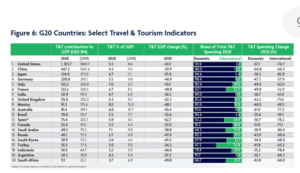…any lessons for Ghana as 2m tourists are targetted in 2 years?
Domestic spending has propelled countries like China, USA, Japan and Brazil to the top. In recent times there are talks of increasing our tourist arrivals to 2 million annually by 2024. I was watching a programme on one of the local TV stations when a tourism expert was being interviewed about this ambitious goal; and when asked to mention the strategy aimed at achieving 2 million tourists to Ghana annually by 2024, his answer lingered on promotion – i.e. placing adverts on CNN and the like. It came to mind that the main focus is still on bringing international tourists here.
Well, that is good because we need the foreign exchange from these international tourists into the local economy. There’s no doubt that when tourists visit a destination and spend money, it helps the local economy through the multiplier effect. However, one question to ponder is: should these targetted tourists decide to look elsewhere irrespective of the publicity, what is the plan B? We shouldn’t forget that many countries, especially African countries, are competing to attract the same international tourists we are seeking to attract. This therefore means countries which have made it to the top encouraged and promoted domestic tourism.
The graph below as published by WTTC gives more highlights. Except Turkey, all countries depended on domestic tourism. South Africa, the only African country on the list, also depended on domestic tourism.

We need to know what the travel propensity for Ghana is. How many Ghanaians take one trip or more in a given year? How many domestic tourists visit different regions of Ghana? These domestic tourists include foreigners living or working in Ghana. How many domestic tourists make use of a paid accommodation when they go on such trips or tours? What are the average nights spent by local tourists? How much money is generated locally from domestic tourism? A regional breakdown would be helpful. What kind of attraction are they attracted to? What are the things do they spend money on? Answers to the above questions will go a long way to help us understand where we are when it come to domestic tourism and domestic spending.
According to figures released by the ministry, domestic tourism grew from 600,000 in 2021 to almost one million in 2022; and underpinning these numbers were people employed in tourism, farmers providing food, caterers and chefs, tour operators, drivers and handicraft producers, musicians and artists, among others. Its positive news that there are improvements in the figures; however, there’s a need to do more.
Why is domestic tourism so important?
Domestic tourism can be defined as activity by resident visitors within the economic territory of the country of reference. Simply put, when tourists travel within their own country they are said to be involved in domestic tourism.
Many developed countries have impelled their economy by encouraging their citizens to engage in domestic tourism. This means more domestic spending, thus dissuading spending outside their country. This has been achieved by the implementation of a well laid-out plan for improving infrastructure and tourist attractions, thereby attracting investments in the tourism industry.
Local tourists spending their money in-country tend to improve the national economy – contrary to when they spend their money in other countries; therefore improving the local economy of destinations visited. This is one of the main reasons why many tourism-oriented countries dissuade their citizens from taking tours or trips outside of their own nation.
Dissuading them has not been compulsory, but has been achieved by offering them better alternatives within the home-environment. With a growing middle-class in our country, it is a known fact that many Ghanaians prefer undertaking holidays outside Ghana. Two days ago, I heard a tour company promoting tours to some other African countries. I thought the company should rather promote other Africans to come to Ghana and spend their money.
We must not be quick to promote other countries to the detriment of our nation. I wish government could ban such tours. One may argue that it’s a free market; however, we need to have a sense of patriotism and understand the economics behind some of these actions. It mustn’t be about our personal economic gains but rather the overall gain for Ghana. We have equally beautiful features that match any of the attractions in Africa. The man was talking about enjoying nature to its best outside Ghana. The best place to enjoy nature to the best is here in Ghana, at Mole National Park or Kakum National Park. I have also heard of a new one being advertised on radio.
Encouraging domestic tourism and domestic spending will come with improving accessibility around the country. The World Travel & Tourism Council’s (WTTC) report confirms that whereas countries often tend to focus on international tourism due to the revenue earned through foreign currency, domestic tourism remains the leading form of tourism – representing an important tool for regional economic growth and development.
With over 50% of the global population now categorised as ‘middle-class’ or ‘rich’, more and more people can afford to travel. Research suggests that domestic tourism demand picks up at an income level of about US$35,000, while international travel takes off at around US$50,000. An increasing number of households in emerging economies which are approaching or have already reached these thresholds, including China and India, are likely to contribute to sustained growth in domestic travel spending.
In effect, over the next ten years an additional 65 million Chinese and 9 million Indians will enter the middle-class. Domestic tourism (DT), historically speaking, is in fact the first form of tourism that was practiced; and today it continues to account for the most part of this activity by far.
Over the last decade, the Chinese government has been a staunch supporter of domestic tourism – investing in the development of a rail network and air infrastructure to accommodate the expansion of low-cost carriers in second- and third-tier cities. This has improved transportation connectivity and reinforced tourism development in less-visited areas. China is expected to remain the leader in domestic tourism, continuing to widen its lead over the USA.
Reliance on domestic tourism
Domestic travel is the main driving force of Travel & Tourism in major economies. In fact, in 22 of the 31 countries analysed, domestic tourism accounted for at least 50% of the total Travel & Tourism spending – Brazil ranking first with 94% of spending coming from domestic tourists. Brazil is followed by India, Germany, China and Argentina, each with 87%. Japan, Mexico, the UK and USA also enjoyed significant levels of domestic spending – all at 80% or more of Travel & Tourism’s internal spending.
Strong domestic tourism in most of these countries is driven by a growing or sizeable middle-class population, an increase in spending power among domestic consumers, sheer size of the countries, government initiatives in promoting new locations, and strong or improving transportation infrastructure and economic links between different internal regions.
For instance, China has built an average of eight new airports every year since 2013, and rapidly developed its high-speed rail network over the last 15 years – which has opened-up previously remote places to domestic tourists. In India, government plans to build 100 new airports with a budget of US$60bn over the next ten to 15 years, to accommodate and stimulate the demand for domestic travel. Turning to domestic tourism will need massive infrastructure investment.
Philip Gebu is a Tourism Lecturer. He is the C.E.O of FoReal Destinations Ltd., a Tourism Destinations Management and Marketing Company based in Ghana and with partners in many other countries. Please contact Philip with your comments and suggestions. Write to [email protected] / [email protected]. Visit our website at www.forealdestinations.com or call or WhatsApp +233(0)244295901/0264295901.Visist our social media sites Facebook, Twitter and Instagram: FoReal Destinations.










